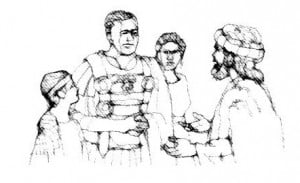Peter and the Gentiles – Teaching Plan
Key Thought : Peter made many mistakes, but his teachable attitude and openness to God’s leading in his life is a lesson for us today.
1. Have a volunteer read Acts 2:14-18.

Image © Lars Justinen Goosalt.com
a. Ask class members to share a thought on what the most important point in this text is.
b. What is the only purpose for the gift of tongues? Are we to expect to see this gift manifested today?
c. Personal Application : Have you ever experienced or met someone who believed in tongues, but you felt was more focused on emotion, exultation of self, or proof that they had the Holy Spirit? Share your thoughts.
d. Case Study : One of your relatives states: “Is your church more focused on outreach and evangelism or are they more inwardly focused? How are the church funds spent?” How would you respond to your relative?
2. Have a volunteer read Acts 10:1-4.
a. Ask class members to share a short thought on what the most important point is in this passage.
b. How do you think Cornelius, a non-Jew, came to be a devout man who feared God?
c. Personal Application : Have you ever had an experience where God has sent someone to you or to your church so that you could witness to them?” Share your thoughts.
d. Case Study : One of your friends states, “I think this is an example of not running ahead of the Lord. Peter was right to wait for God to have people come to him. We try to reach out, but the people aren’t ready for the gospel. We should wait and pray and God will send people to us who are searching for truth.” How would you respond to your neighbor?
3. Have a volunteer read Acts 10:17.
a. Ask class members to share a short thought on what the main idea of this text is.
b. Does God speak to His servants today in visions and dreams, or is that a thing of the past?
c. Personal Application: Has God ever given you a vision or dream that you weren’t sure what the meaning was? How can we be sure it’s from God and not Satanic or pickles and ice cream? Share your thoughts..
d. Case Study : One of your neighbors states, “Doesn’t this text show that it doesn’t matter what goes in the mouth, but what comes out? Isn’t it okay to eat whatever we pray over and God will bless it?” How would you respond to your friend?
4. Have a volunteer read Acts 15:19-21.
a. Ask class members to share a short thought on what the main idea of this text is.
b. Why is there a restriction here on things strangled, blood, and food offered to idols? Is this a cultural restriction, or does it apply to us today?
c. Personal Application: How do we “trouble” those who are coming into the church? How can we guide and teach without being judgmental? Share your thoughts.
d. Case Study : Think of one person who needs to hear a message from this week’s lesson. Tell the class what you plan to do this week to share with them.
(Note : “Truth that is not lived, that is not imparted, loses its life-giving power, its healing virtue. Its blessings can be retained only as it is shared.” Ministry of Healing, p. 148)
